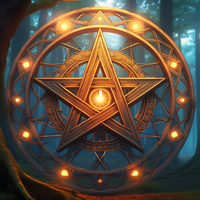Main Page: Difference between revisions
No edit summary |
|||
| Line 1: | Line 1: | ||
= Introduction to Wicca = | = Introduction to Wicca = | ||
Wicca is a contemporary pagan spiritual tradition that has captivated countless individuals seeking to reconnect with nature, their inner selves, and ancient European beliefs. | |||
At the heart of Wiccan belief lies a deep reverence for both masculine (God) and feminine (Goddess) energies present in all aspects of life. These deities are seen as interconnected, with the God symbolizing strength, power, and protection while the Goddess embodies love, nurturing, and creativity. Wiccans honor these dualistic forces by living harmoniously within nature's cycles and striving for balance between them. | |||
Wiccan practices encompass various forms of divination (tarot reading or scrying), spell-casting, herbalism, and rituals performed during the eight Sabbats throughout the year. These celebrations mark significant moments in both agricultural cycles and personal growth. The Full Moon Ritual is a communal practice where members come together to cast spells collectively for their community's wellbeing. | |||
Ethics are an essential aspect of Wiccan faith, with its Threefold Law stating that whatever energy one puts out into the universe will return threefold. This principle encourages kindness, compassion, and respect towards all beings. Additionally, Wiccans value self-responsibility, personal growth, and continuous learning. | |||
The origins of Wicca can be traced back to pre-Christian Europe, with influences from various cultures such as Celtic, Norse, and Greek mythology. However, it wasn't until the late 19th and early 20th centuries that Gerald Gardner popularized modern Wiccan practices through his writings. Since then, this spiritual path has grown exponentially, attracting countless individuals seeking a deeper connection with nature and their inner selves. | |||
Wicca is an enriching spiritual journey rooted in ancient European beliefs and practices. It offers its practitioners a profound sense of connection to the natural world, ethical living principles, and opportunities for personal growth through various rituals and practices. May your journey be filled with wisdom and joy! | |||
== What is Wicca? == | == What is Wicca? == | ||
== History and Origins == | == History and Origins == | ||
| Line 46: | Line 56: | ||
=== Books, Websites, and Workshops === | === Books, Websites, and Workshops === | ||
=== Connecting with Other Practitioners === | === Connecting with Other Practitioners === | ||
= Conclusion: Embracing the Wiccan Path = | = Conclusion: Embracing the Wiccan Path = | ||
== Personal Growth and Self-Discovery == | == Personal Growth and Self-Discovery == | ||
== Continuing Your Journey of Exploration == | == Continuing Your Journey of Exploration == | ||
Revision as of 20:57, 23 May 2024
Introduction to Wicca
Wicca is a contemporary pagan spiritual tradition that has captivated countless individuals seeking to reconnect with nature, their inner selves, and ancient European beliefs.
At the heart of Wiccan belief lies a deep reverence for both masculine (God) and feminine (Goddess) energies present in all aspects of life. These deities are seen as interconnected, with the God symbolizing strength, power, and protection while the Goddess embodies love, nurturing, and creativity. Wiccans honor these dualistic forces by living harmoniously within nature's cycles and striving for balance between them.
Wiccan practices encompass various forms of divination (tarot reading or scrying), spell-casting, herbalism, and rituals performed during the eight Sabbats throughout the year. These celebrations mark significant moments in both agricultural cycles and personal growth. The Full Moon Ritual is a communal practice where members come together to cast spells collectively for their community's wellbeing.
Ethics are an essential aspect of Wiccan faith, with its Threefold Law stating that whatever energy one puts out into the universe will return threefold. This principle encourages kindness, compassion, and respect towards all beings. Additionally, Wiccans value self-responsibility, personal growth, and continuous learning.
The origins of Wicca can be traced back to pre-Christian Europe, with influences from various cultures such as Celtic, Norse, and Greek mythology. However, it wasn't until the late 19th and early 20th centuries that Gerald Gardner popularized modern Wiccan practices through his writings. Since then, this spiritual path has grown exponentially, attracting countless individuals seeking a deeper connection with nature and their inner selves.
Wicca is an enriching spiritual journey rooted in ancient European beliefs and practices. It offers its practitioners a profound sense of connection to the natural world, ethical living principles, and opportunities for personal growth through various rituals and practices. May your journey be filled with wisdom and joy!
